Kara McGrath: Last June, I was in one of my regular check-ins with Allure senior news editor Nicola Dall’Asen when she told me that she was considering getting a boob job. This perhaps is not something that you would have divulged to your boss, but Nicola was telling me because she wanted to write about the experience if she ultimately went through with it. And I approved the story on the spot.
I said, yeah, that is a story I want to read, because Nicola has been writing about body image for a decade, including here at Allure, where she launched a column called Learning Curve. And elective plastic surgery and body positivity — at least body positivity when it holds its original political, fat activism focus meaning — are pretty much inherently at odds.
Well, she got the surgery, and now just over a month post-op, she's here to chat with me about her feelings and the story she wrote exactly one week after she got off the operating table.
Kara: Hi, Nicola. Let's talk about your surgery. Can you tell everyone who's listening about the surgery and why you got it?
Nicola Dall’Asen: Yeah, I had a pretty specialized surgery. I got a breast reduction, but only on one breast, and then I had a lift done on both breasts. And I did that cause I had asymmetric [or uneven] breasts. One of them was two cup sizes bigger than the other, and it was making my life an absolute nuisance. I also had like a lot of premature sagging for someone my age — I'm 30, by the way — so I basically just got those two things done to make my life a little more comfortable.
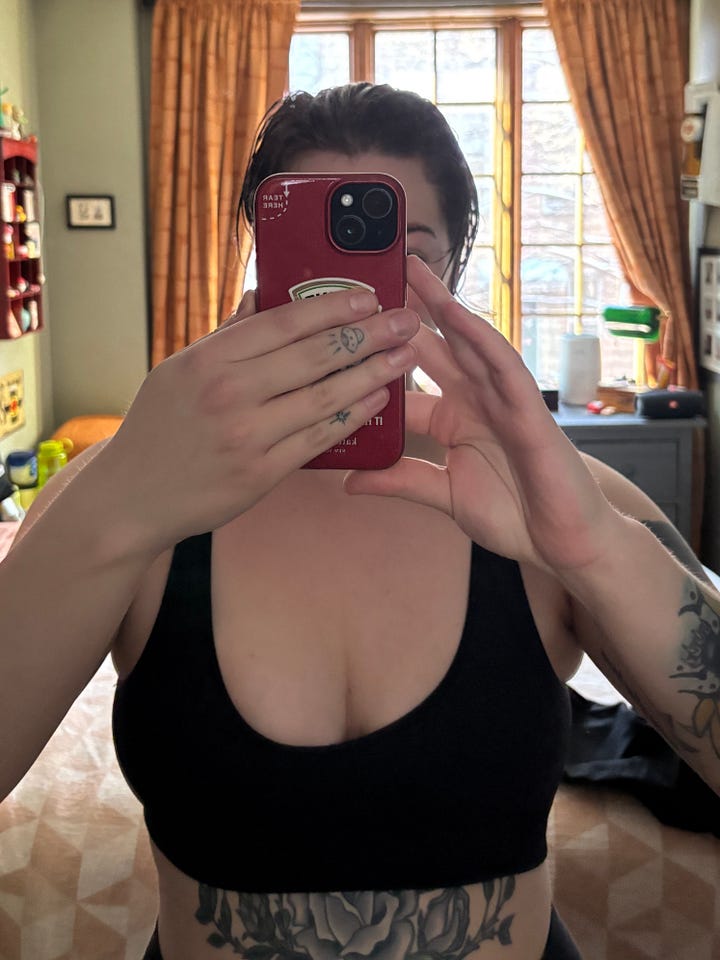
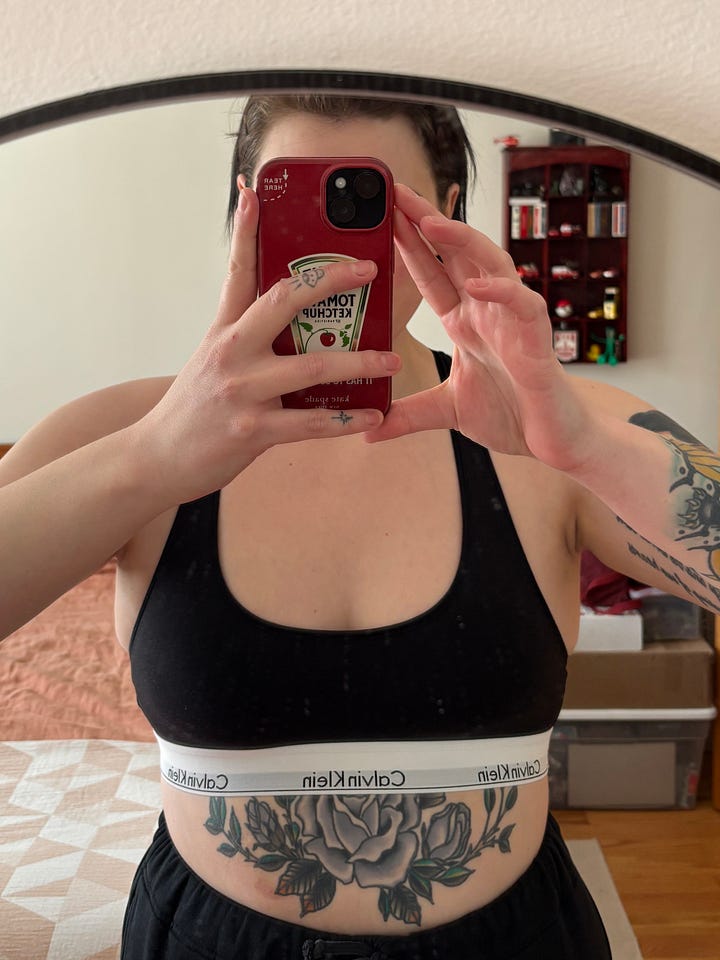
Kara: And you got them done at the same time?
Nicola: Yeah, it was all one procedure.
Kara: So you briefly do mention it in the story, but tell me about some of the other options that were presented to you to solve the sort of asymmetry that you were dealing with, and why those did not feel like the right choice, but this one reduction and two lifts did.
Nicola: So, for context, I saw Dr. Melissa Doft in New York City. She's absolutely incredible. She has a very less-is-more approach, but these options are not gonna objectively be offered to everybody. It all depends on what you want. And what I wanted was just to make my breasts look more similar to what they did like 5 years ago before I had like crazy weight fluctuation that caused the problem to begin with.
Doing the lift seemed pretty obvious, because we wanted to correct the sagging, and then doing the reduction on one side made sense for me, because I didn't want to make either of my breasts bigger. I just wanted them to both be the same size. I was OK with them being small, but Dr. Doft also offered me the option of doing implants.
I think a lot of people who are trying to correct breast asymmetry get implants, because they would rather go up a size than down a size like I did, so she offered me implants and I absolutely said no to that — just because I didn't want anything foreign in my body. I did not like the idea of either or both of my breasts becoming bigger cause, I don't like having big breasts. And on top of that, she also said that if I wanted to, we could take fat from my stomach and then put them kind of like at the top area of my breasts, and that could be an alternate way of creating more of like a round shape without the use of implants. I also turned that down — just because it just wasn't important to me.
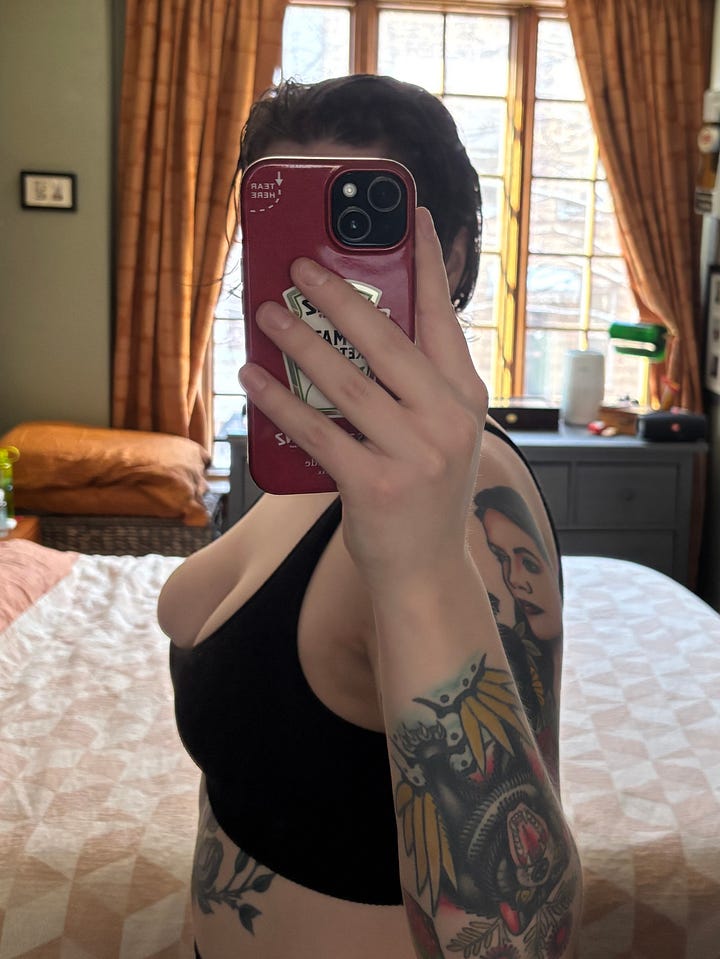
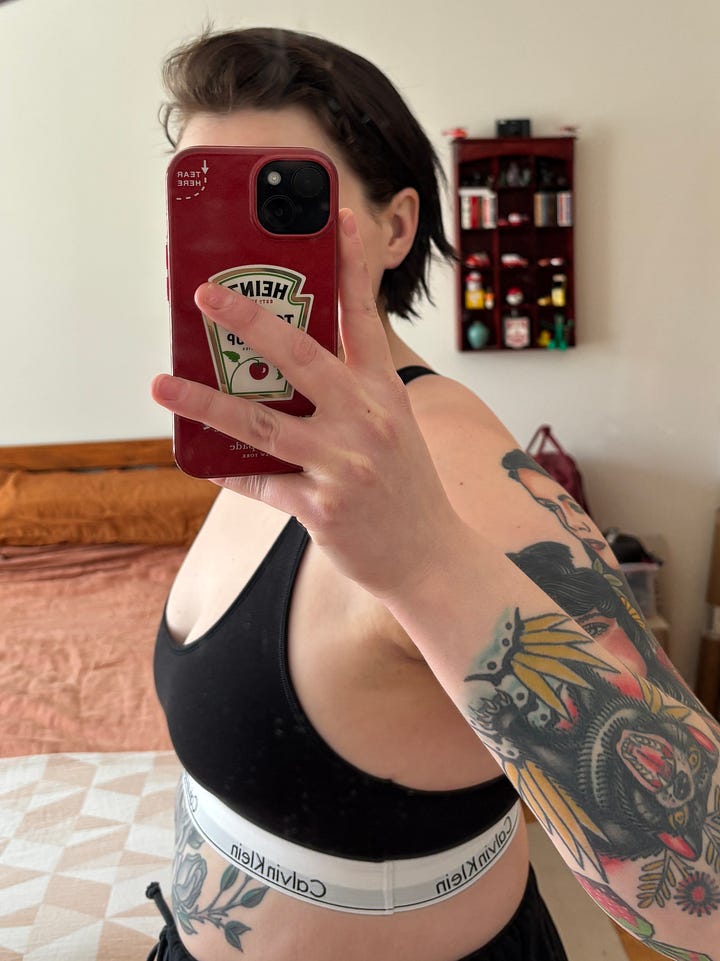
I would rather make my breasts look like they're still mine. I wanted them to feel like it was still an authentic-to-me experience. And I'm sure other people don't feel that way, but for me, I just wanted the size and sagging corrected, and everything else to remain the same. That's why I turned kind of like the more aesthetic, optional stuff down.
Kara: Plus, I've always felt like implants just sound like so much work, because you have to get them replaced — just sounds like more of a hassle to me.
Nicola: Yeah, and I have one other friend of a friend who recently — like a year or two ago — also got a breast lift, solely because she wanted to. She just liked how it looked. She had them removed later because they were so uncomfortable. And so she went through the whole healing process twice basically, and it sounded like an absolute nightmare. And, regardless of what I wanted my breasts to look like, I just knew I was not willing to risk not liking it if I had something inside of me that I didn't want there.
Kara: Totally! So when you pitched this story to me, initially, you pitched it as like, I might do this. I'm not really sure. It does sort of like contradict with everything I stand for and arguably what I’ve become known for. And you have this column Learning Curve, which is all about body acceptance and navigating different hangups that you've had about your own body, and also society-a-large’s hangups with bodies. And even in the piece, towards the beginning, you take a pretty strong stance, which I flagged when I was editing, against anyone who gets plastic surgery.
You called it “an unfeminist cheat code" to body acceptance.”
But then further down in the piece, you are reflecting a bit, and you say, You know, actually, I have always thought that people should be able to do whatever they want with their bodies. So how did you square those two arguably contradictory statements, both in writing the story, but also in when you were making the decision to get the surgery?
Nicola: Yeah, it was confusing to write, so it must have been confusing to edit it. So many of my feelings about this surgery and about the topic of surgery at large are very complex and contradictory, and it's hard to put that into words, and probably even harder to help somebody else put that into words. So you're absolutely correct in saying that these are two very competing beliefs that I put out on the table.
And to elaborate on that, I guess, as far as thinking that plastic surgery was kind of like this “unfeminist thing,” these are very much beliefs that I held kind of privately and like internalized and maybe projected on other people, but never actively passed vocal judgment on people for pursuing it, right? I think where I stood was that I just think it's… plastic surgery as a whole is a societal factor in the way that we see ourselves, and does kind of provide a cop out of sorts to people who are having trouble accepting their bodies for what they are.
And I was personally of the belief prior to getting the surgery, that it's healthier and it's better for somebody in the long run to just do that — to accept their body as it is without seeking the help of potentially unnecessary cosmetic treatments, right? That was kind of the belief that I held. And once I realized that getting the surgery was something that… maybe it wasn't like medically necessary — it wasn't something that like my insurance could cover, for example. But once I'd come to the conclusion that I needed to get surgery, in order to have relief from this very physically inconvenient problem that I was having…
I came to the understanding through my own mental torture of myself that what I was feeling wasn't so much a staunch kind of feminist thing. It wasn't so much a moral code of mine. It was me feeling resentful of other people for finding a problem and then just fixing it.
Because — for background information — I have chronic pain. I've been through the medical system a bazillion times with surgeries, with physical therapies, with injections, with imaging — everything. I've never successfully been able to solve that problem. I've felt kind of cast aside by the medical industry a lot in my life. So to watch other people be like, I'd rather change this thing and then just do it, was something that inspired a lot of jealousy within me. I think that was really what I was projecting onto other people more so than a moral belief that plastic surgery is a thing that is always wrong and that it's always unnecessary, so to speak. And now, reaping the benefits of my own surgery, more and more every day, I see how untrue that that sentiment was.
Kara: Yeah, so I'm sure there are other people in your situation who might be considering some sort of “elective surgery” — as you said like “surgery that your insurance won't cover,” basically — but are having similar feelings. Maybe they also have been involved in sort of body acceptance activism / fat activism, and so the surgery is feeling like something that is against some of their very strongly held morals.
So, can you walk us through a little bit what you did to come to that conclusion that, actually this is right for me? What are some tips you can offer for working through those feelings? I know, in the story, you mentioned that… I hate to give credit to a man, but you did say that your boyfriend — chatting with him [laughs] — helped you work through some of those feelings. So, tips for the readers?
Nicola: I'm trying so hard not to laugh. [laughs] Yeah, well, the gist, I think… If you've been to therapy in any regard, you already know this, which is how I came to this conclusion, is that: Just verbalizing your feelings exactly as you're feeling them when you're having them, when it comes to having conflicting feelings about this kind of thing, like that's really the key to slowly, but surely figuring out what's going on. Because I think before you go ahead and do the thing, and get put under anesthesia and change your body permanently — before that happens…
I think the most important thing is to have a really honest reckoning with yourself about where the desire itself to do the surgery comes from.
And, more importantly, like where the feeling that you're not doing something that's good for you is coming from — or that's good for society.
I think for me it was: what is good for me might not be good for society or vice versa, right? As a person who writes about body image for a living, I am constantly thinking about how my actions play into stereotypes of plus size people, for instance. Or how are my actions potentially enforcing standards that are unfair to to women and femme people? And so I thought that getting a surgery was me basically betraying like my community, I guess, when in reality I just had to accept that I was doing something that was good for me, and maybe that was enough.
So, I would say my tips are: Talk as much as you can to the people in your life who are supportive about your potential decision to go through with the surgery. Talk to your therapist about it or if you have a partner who you feel comfortable discussing that with, talk to them about that — or your friends, whoever. And also be sure to spend a good amount of time, like alone in solitude, just like internally reflecting with no objection or interruption.
Because the moment that it hit me that my mixed feelings were coming from my own trauma and insecurity, that was a moment where I was totally alone and quiet in my bedroom, looking at myself naked in a mirror after a shower. Like I feel like it finally came through in that moment after months of internal conflict. It finally came through to me in that particular moment, because I think it was the first time where I had been truly totally alone with my thoughts in quite some time, which doesn't happen to me often, because I live with a partner who is working opposite schedules from me, so we tend to be in the house at the same time always. So make sure you spend those moments alone where you're truly not being interrupted in your thoughts, because that's when you'll start to notice where those mixed feelings are coming from.
Kara: I think that's good advice even for people who are not considering major surgery. Just try to find some time alone. I know that I always got my little podcast in my ear, and I'm like, When's the last time I had a thought?
Anyways, I don't want to spoil the whole story, but you wrote the piece about a week after you had done the surgery. Like you said, you submitted it to me. You're like, I had a lot of thoughts, so I just whipped this out. So, here you go. But now it's been a little over a month since you had the operation, right?
Nicola: I think 5 weeks.
Kara: So how are you feeling? How is recovery going? How much longer do you have in recovery for this surgery?
Nicola: Yeah, to put an exact date on it for the people at home, I got it done on January 29th, and most of the immediate healing process happens in the first 6 weeks. Like that's the period of time where you're not allowed to do strenuous activity. That's the period of time where I have to wear a surgical bra I quite frankly could not hate more, which funnily enough, you have also had to wear — and you know exactly what I mean by how terrible it is.
Kara: [laughs] The twist in this episode is that I also had surgery on my breast the same week that Nicola did, and we just found out last week that we got to wear the same horrific, like puke pink surgical bra with Velcro that just is like the most irritating Velcro I've ever felt in my life. Anyways, go on, how are you feeling?
Nicola: [laughs] Well, as far as the surgical bra goes, I'm still wearing it. I have like one more week where I have to wear it day and night, and I am counting down the hours until I can just like take it off forever. So like physically I'm feeling good, albeit I am starting to get mentally very restless from not being able to do like the amount of physical activity that I try to do on a daily basis, particularly in regards to physical therapy things I do for my chronic pain.
But, as far as the practical elements go, we're at the point where… it took a long time for me to be able to sleep on my side or my stomach, which is for me the only way that I can sleep comfortably. So it's taken me about 4 to 5 weeks to be able to sleep really comfortably, which is arguably the hardest part.
You can definitely see my scars. However, if you've ever had surgery, you know this already, which I did going into this, is that you will have a period where your scars are fresh and they're like kind of lumpy, because there's sutures in there that haven't dissolved totally. So that process has happened now — the sutures are dissolved, the scars are very much visible, and they're there. However, they are starting to smooth out, and I'm getting somewhat of a sense of what they will look like a year from now when they are, as they say, “fully matured” in the medical industry.
They're a little sensitive in some parts. The left breast — because it had the added trauma of having a lot of fat taken out of it basically… So my scars on that side, for context, there's one scar that runs on the under boob side, and then from the middle of those scars, there's one line running up the breast and then there's a scar around the line of my nipple…
Because a breast lift requires that they basically cut your nipple off and sew it back on into a new position. [laughs]
Kara: Wow, I don't think I knew that.
Nicola: So yeah, so that's where my scars are, and because the left one kind of has that added trauma, that scar that runs along the underside is a lot longer. It's a lot more sensitive. I think, generally speaking, the healing process for the left side will just be a tiny bit longer than it is for the right. So I still have like… every now and then I'll feel like a little like pang or, you know, kind of like soreness — kind of like a workout soreness sometimes now just on the left side. But, otherwise, I think recovery is going exactly as it's supposed to, which is great.
Kara: That's all you can ask for, right, [laughs] is that it looks normal and uneventful?
Nicola: Exactly! I mean, I wouldn't say the first few weeks were uneventful. The sensations you feel in your nipples, they're constant. Like they tell you you're gonna feel like a pulling sensation or a tugging sensation, and that's an understatement.
You're sitting there just fully distracted from life, because your boobs are screaming at you for quite some time.
But that part's over, so I'm happy to report that.
Kara: That's good. Yeah, something that really stood out to me about my surgery is that my surgeon, he was great. Overall, I had a great experience. I mean, he's the only person who has ever even offered to do anything about the pain that I was experiencing in my breast, so he automatically gets like a 10 from me.
But he was so fixated — every conversation we had, he was like, And just so you know, there's gonna be a scar. And I was like, Yes, I understand that if you cut open my breast and pull out a lump, you will have to have a scar. And he's like, Well, you're like, you're gonna hate it. Just so you know, you're gonna hate your scars. And I was like, I don't think that I'm going to care even one bit. If the side effect of me no longer having like shooting 10-out-of-10 pain in my breast every single day is that I have a 2-inch scar, I actually think I'll be fine.
So, I'm about a month post-op as well, and I also could not care less about the scar as predicted. But your scars are a lot. I have like a 2-inch incision on one breast. Yours are a lot more intense. Are you feeling any sort of way about the fact that you might have this permanent scarring or is that also sort of a non-issue for you?
Nicola: I feel like it's a kind of a non-issue for me. A few years ago I had a major spinal surgery — again due to the aforementioned chronic pain. And so I have a 4-inch scar on the left side of my like lower tummy area, cause that's where they had to enter to remove a disc I had that had herniated. And so I've been through the whole scar healing process. I already have a surgical scar. I'm very aware of what I can expect over time as far as numbness and the appearance goes. And I'm also just somebody who's generally very prone to scars. Like, I swear to God, if I hit my hand on the doorknob too hard accidentally, you'll know for the next 20 years. So I'm already covered in scars. I really don't mind that being a thing. I'm also, similar to you, a very tattooed person, so I feel like if I don't like something, I'll just go get a tattoo put on top of it, so I don't particularly feel that strongly about it.
And I think this is also like a testament to the fact that I saw a surgeon who's very artful about the way that she does incisions and sutures and things like that. The scars — compared to the one from my back surgery — are so like delicate. They're very thin lines. I feel like, in the end, they're gonna be almost unnoticeable, and also part of that comes down to aftercare.
Like I don't know if you were given any like aesthetic-based aftercare instructions for your scars, but when you're getting a breast reduction, because it's like with the intent that people won't be able to tell that you got a surgery, you definitely have very particular aftercare instructions.
For a couple of weeks, I was instructed to put a very specific type of 100% silicone gel just around all of the scars, and do that twice a day. And then now I'm at the point where you have to buy these big silicone-like strips that come in the shape of where the scars lay.
So I basically wear those on top of the scars. They're very adhesive, so you're wearing them for like basically all of your waking hours of the day. But I'm not 100% sure what that does for like the scar itself or for the skin, but at the very least it's like a nice protective shield against friction. So I'm pretty confident that as long as I do those things that my doctors advised consistently and as instructed, I really don't foresee the scars being even really noticeable a year or so from now.
Kara: That's wonderful! Well, Nicola, thank you so much for giving us a little extra bonus, behind-the-scenes, exclusive content for the newsletter, but I want to let everyone listen to you read your beautiful piece. I highly recommend it. One of my favorite stories that I have read this year, and I'm not just saying that, I swear.
So, without further ado, thank you for joining us and everyone else stick around to hear Nicola read her story in full.
Nicola: Thank you! I hope everyone enjoys this edition of Behind the Boobs. [laughs]
My Boob Job Went Against Everything I Believe In
“I was staunchly anti-plastic surgery until a breast augmentation changed my life.”










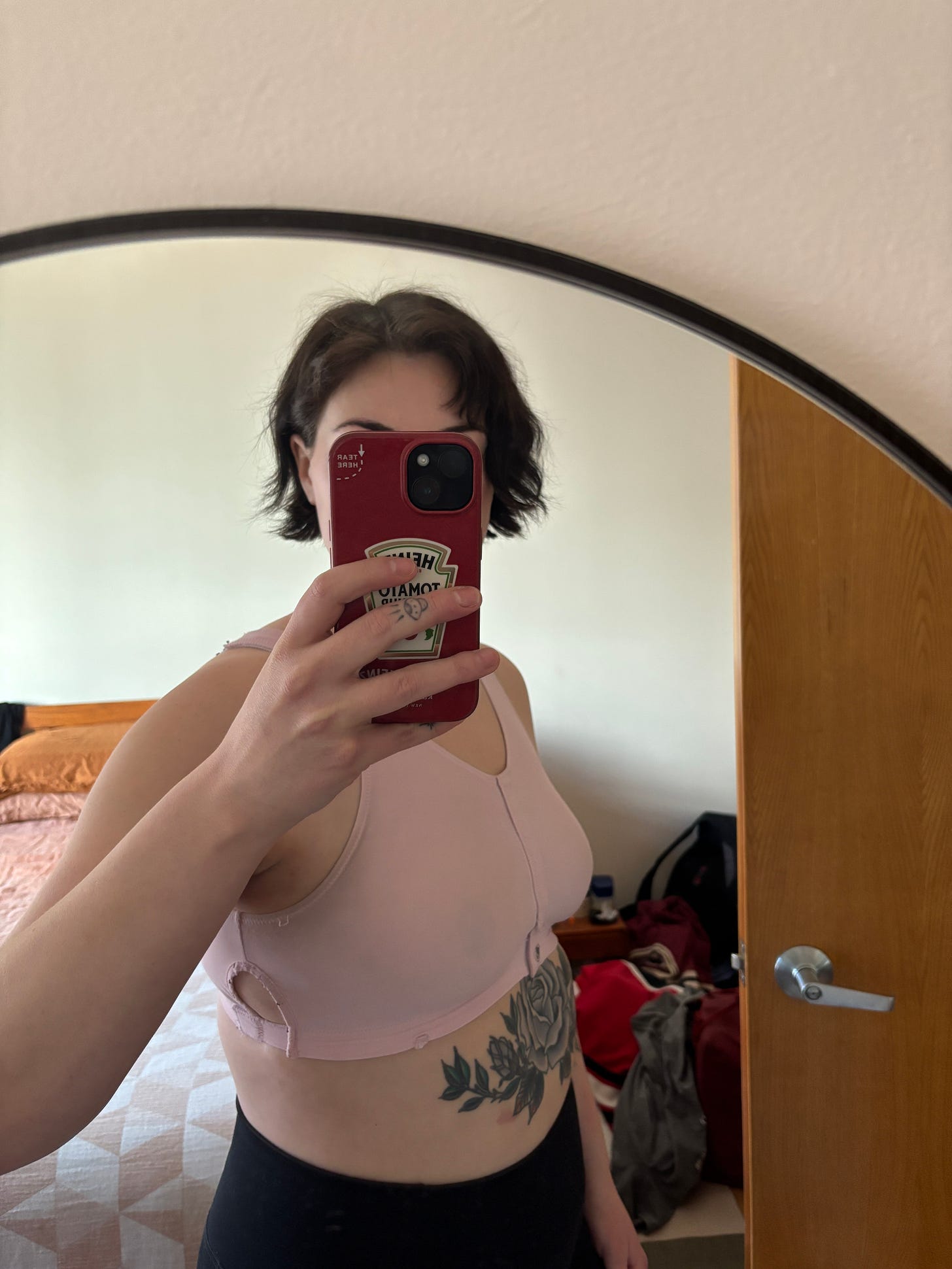
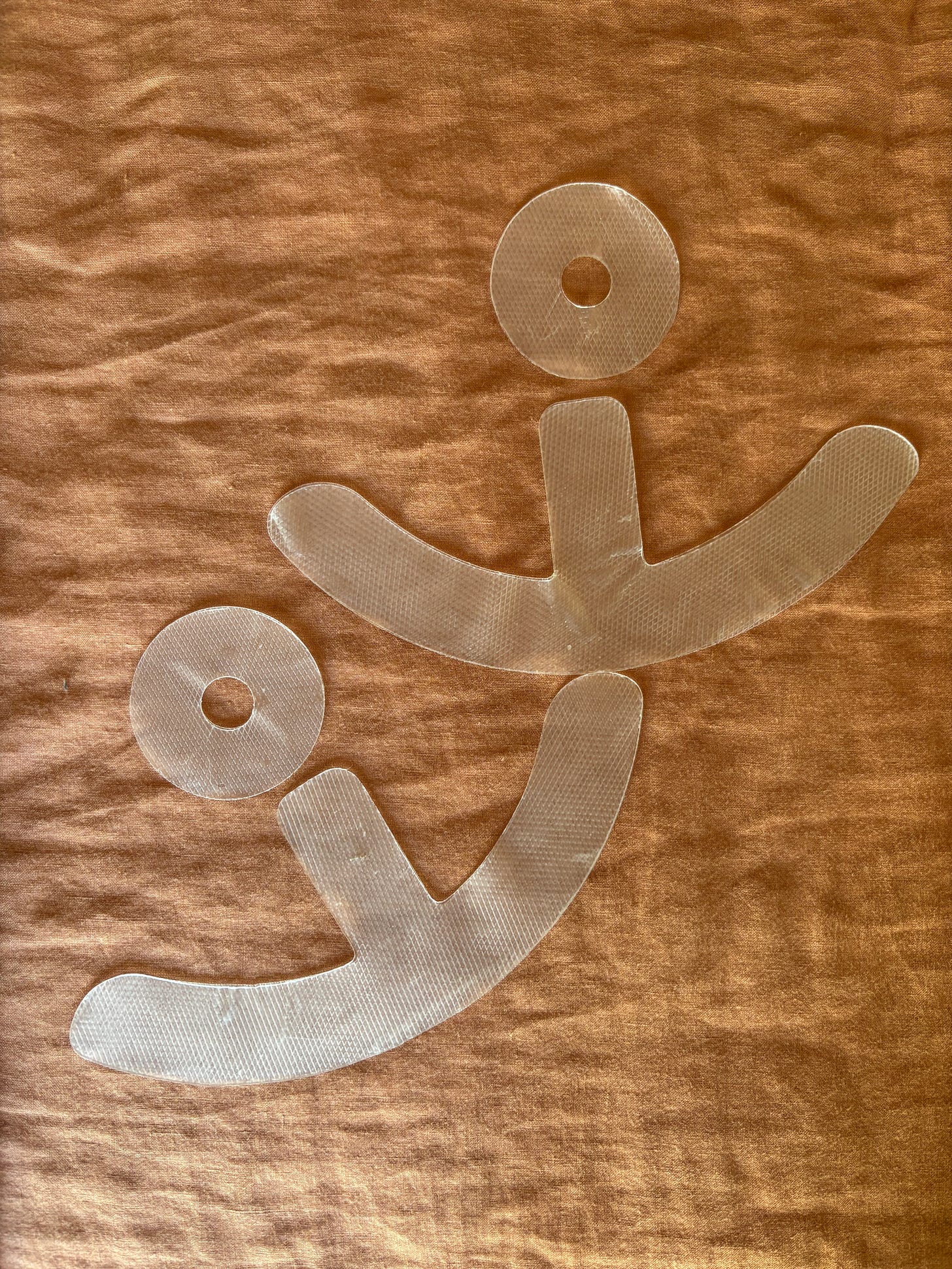
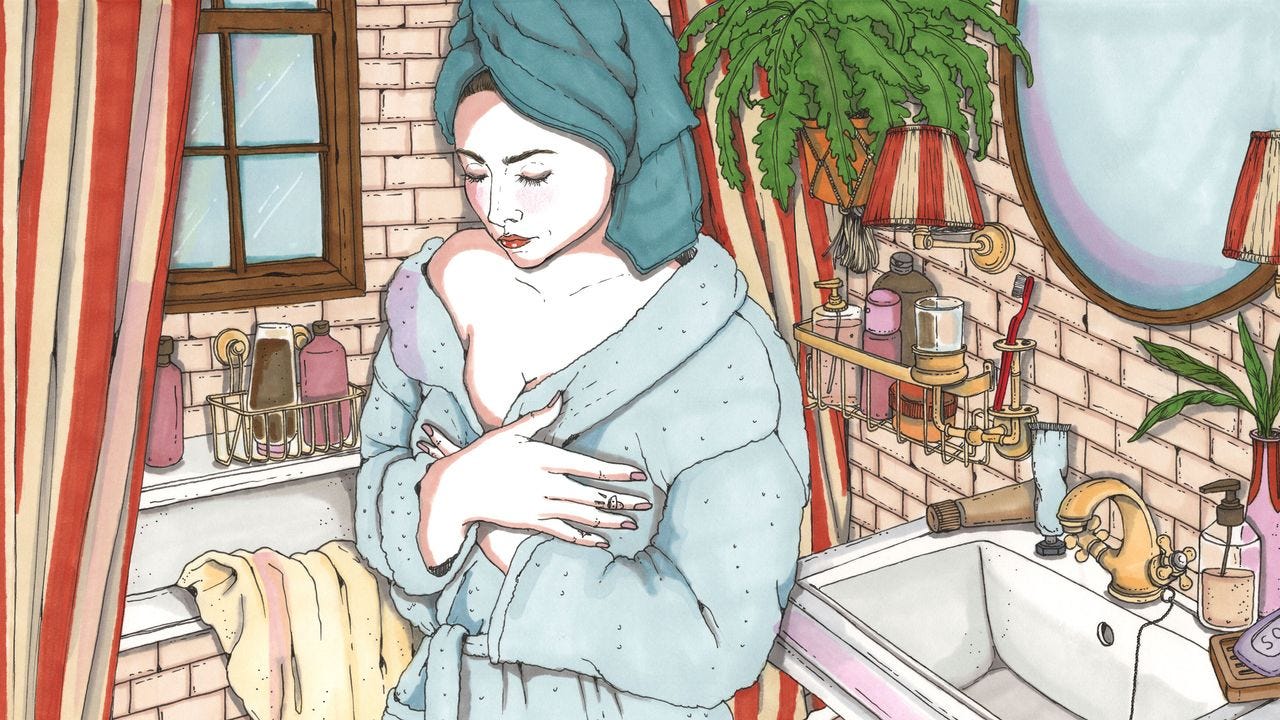




Share this post